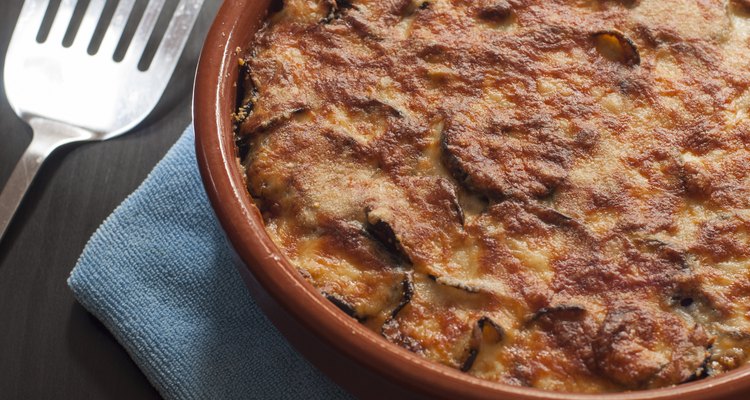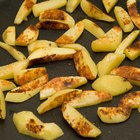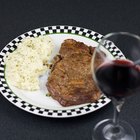
ruidoblanco/iStock/Getty Images
Eggplant acts like a sponge for oil, soaking it up as it fries. To reduce the amount of oil and the overall greasiness of your meal, bake your eggplant instead of frying it. The end result won't be quite as rich or crispy, but it will be tender and satisfying. Plus, baked eggplant absorbs flavors as readily as the fried version.
Whole or Halved Eggplant
You can bake an eggplant whole, using no oil at all. Poke it all over with a fork or sharp knife to prevent it from exploding from the trapped steam, and bake it until it's soft and droopy. This takes about an hour at 375 degrees Fahrenheit, and about 45 minutes at 400 F. To speed up cooking time and add a little richness, cut the eggplant in half lengthwise, brush the cut surfaces with oil, and bake them face-up until the cut surfaces start to brown, about 45 minutes at 375 F or 30 to 40 minutes at 400 F. Cutting groves in the exposed oiled surface speeds up the cooking process and allows oil to penetrate the eggplant flesh.
Sliced Baked Eggplant
To cook eggplant quickly in the oven, slice it in rounds about 1/3-inch thick, brush them with oil and arrange them on an oiled baking sheet. Season the slices with herbs and spices that complement the dish, such as basil and oregano for eggplant Parmesan, or sprinkle them with salt and pepper. Sliced baked eggplant uses more oil than whole or halved eggplant, but less than fried eggplant. Eggplant slices cook to doneness in about 20 minutes in a 375 F oven.
Cubed Baked Eggplant
Use baked, cubed eggplant in salads, or add fully cooked eggplant to mixed vegetable dishes that you prepare on the stovetop. You'll use less oil if you first bake eggplant first. Cut eggplant into 1-inch cubes, toss them with enough oil to coat, and then spread them on an oiled baking sheet and bake them at 375 F for 45 minutes or until they're fully tender. Like baked, sliced eggplant rounds, baked eggplant cubes use more oil than whole or halved baked eggplant but less than fried eggplant.
Eggplant Baking Tips
The smaller the eggplant pieces you bake, the more quickly they cook. Because eggplant soaks up so much oil, toss it in just enough to coat it. You'll use less oil than if you fried your eggplant, but it retain some of the richness of the fried version. Olive oil is the best oil for baking eggplant for Mediterranean dishes such as eggplant Parmesan and eggplant moussaka. Neutrally flavored oils such as peanut or canola are the best options for Mexican, Chinese or Indian-style dishes.
Related Articles

How to Bake a Whole Eggplant

How to Cook Jerusalem Artichokes

What to Do With Pizza Dough When You're ...

How to Substitute Pumpkin for Oil

How to Reduce the Acidity in Eggplant

How to Sautee Potatoes

How to Cook 5 Lbs. of Beef Tenderloin

How to Cook French-Fried Turnips

How to Treat Leather Boots With ...

The Best Ways to Fry Hush Puppies

How to Make Pan-Seared Baked Steak

What Is Expeller Pressed Canola Oil?

Can You Over-Bake a Potato?
How to Grill Chayote Squash

The Shelf Life of Pumpkin Seed Oil
What Is Panko Flour?

How to Make Cornbread in a Cast-Iron ...

What is Rapeseed Oil?

Can You Bake Wonton Wrappers Instead of ...

How to Substitute Applesauce for Oil in ...
References
Writer Bio
Devra Gartenstein is a self-taught professional cook who has authored two cookbooks: "The Accidental Vegan", and "Local Bounty: Seasonal Vegan Recipes". She founded Patty Pan Cooperative, Seattle's oldest farmers market concession, and teaches regular cooking classes.
Photo Credits
ruidoblanco/iStock/Getty Images